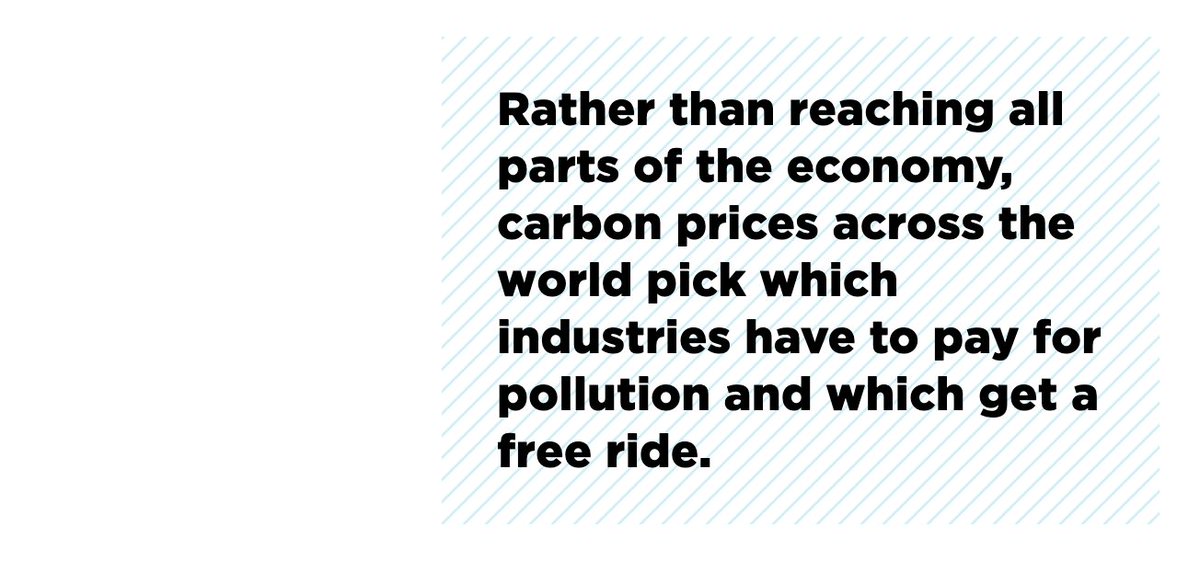Carbon pricing has dominated climate policy debates for decades. But the solution is ineffective and politically toxic.
We need standards, investments and justice to meet this crisis at its scale.
My latest in @BostonReview with @mmildenberger. https://abs.twimg.com/emoji/v2/... draggable="false" alt="🧵" title="Thread" aria-label="Emoji: Thread">... https://bostonreview.net/science-nature-politics/leah-c-stokes-matto-mildenberger-trouble-carbon-pricing">https://bostonreview.net/science-n...
https://abs.twimg.com/emoji/v2/... draggable="false" alt="🧵" title="Thread" aria-label="Emoji: Thread">... https://bostonreview.net/science-nature-politics/leah-c-stokes-matto-mildenberger-trouble-carbon-pricing">https://bostonreview.net/science-n...
We need standards, investments and justice to meet this crisis at its scale.
My latest in @BostonReview with @mmildenberger.
Here are some facts about carbon prices, in the wild:
- they cover 22% of our global emissions, but most are riddled with loopholes
- most prices are way too low to drive meaningful change
- even high prices don’t always change behavior (see: Norway)
- they cover 22% of our global emissions, but most are riddled with loopholes
- most prices are way too low to drive meaningful change
- even high prices don’t always change behavior (see: Norway)
Carbon pricing should ideally do two things:
1) innovate new technologies
2) reduce emissions
Alas, the evidence suggests it& #39;s accomplishing neither goal in practice.
1) innovate new technologies
2) reduce emissions
Alas, the evidence suggests it& #39;s accomplishing neither goal in practice.
Carbon prices do not cut emissions fast enough. Estimates range from 0.2-2% a year. The best is likely BC& #39;s policy. Optimistically, it cut emissions 2% a year.
We need emissions cuts of almost 8% a year to limit warming to 1.5 °C... This ain& #39;t it, folks. https://www.sciencedirect.com/science/article/abs/pii/S0301421515300550">https://www.sciencedirect.com/science/a...
We need emissions cuts of almost 8% a year to limit warming to 1.5 °C... This ain& #39;t it, folks. https://www.sciencedirect.com/science/article/abs/pii/S0301421515300550">https://www.sciencedirect.com/science/a...
Since carbon pricing doesn’t cut emissions fast enough, we shouldn’t be surprised to find Big Oil pushing it as their preferred solution.
As @leehwasserman put it: “Beware of Oil Companies Bearing Gifts." https://www.nytimes.com/2018/07/25/opinion/carbon-tax-lott-breaux.html">https://www.nytimes.com/2018/07/2...
As @leehwasserman put it: “Beware of Oil Companies Bearing Gifts." https://www.nytimes.com/2018/07/25/opinion/carbon-tax-lott-breaux.html">https://www.nytimes.com/2018/07/2...
Research also suggests carbon prices don’t drive much innovation.
As @ETH_EPG has shown, cap-and-trade systems tend to produce incremental improvements in polluting technologies rather than new, clean alternatives. https://www.sciencedirect.com/science/article/abs/pii/S2210422411000499?via%3Dihub">https://www.sciencedirect.com/science/a...
As @ETH_EPG has shown, cap-and-trade systems tend to produce incremental improvements in polluting technologies rather than new, clean alternatives. https://www.sciencedirect.com/science/article/abs/pii/S2210422411000499?via%3Dihub">https://www.sciencedirect.com/science/a...
Carbon pricing also gets the politics backward.
It highlights the short-term costs of climate action, while concealing the long-term benefits of addressing climate change. This combination of clear, concentrated costs and opaque, diffuse benefits is politically toxic.
It highlights the short-term costs of climate action, while concealing the long-term benefits of addressing climate change. This combination of clear, concentrated costs and opaque, diffuse benefits is politically toxic.
Our argument squares with @greenprofgreen& #39;s: "politically, it’s done more harm than good… These political costs just aren’t worth the incremental environmental improvements carbon pricing produces." https://jacobinmag.com/2019/09/carbon-pricing-green-new-deal-fossil-fuel-environment">https://jacobinmag.com/2019/09/c...
"A carbon price of $15 or $20 a ton does little to actually reduce emissions — and it either inspires false optimism (“We’re doing something about climate change!”) or sows further opposition (“Why should I pay more?”). Neither helps.” - @greenprofgreen https://jacobinmag.com/2019/09/carbon-pricing-green-new-deal-fossil-fuel-environment">https://jacobinmag.com/2019/09/c...
Now what about carbon price and dividend policies? These exist in two countries: Canada & Switzerland. @mmildenberger has studied both. Neither makes the policy more popular.
The dividend is a band-aid solution to carbon pricing& #39;s political woes.
The dividend is a band-aid solution to carbon pricing& #39;s political woes.
What should we be doing instead? Following @JoeBiden& #39;s lead with standards, investments, and justice.
- Set the rules of the road: 100% clean electricity by 2035
- Back it with strong investments: 20% of the federal budget!
- Center justice: 40% of funds to frontline communities
- Set the rules of the road: 100% clean electricity by 2035
- Back it with strong investments: 20% of the federal budget!
- Center justice: 40% of funds to frontline communities
We should also follow @SenKamalaHarris& #39;s lead, and hold polluters accountable through our justice system.
Credible legal threats could bring polluters to the table to negotiate for meaningful climate action, not policy that looks good on paper but fails in practice.
Credible legal threats could bring polluters to the table to negotiate for meaningful climate action, not policy that looks good on paper but fails in practice.
If we are lucky enough to have a chance at federal climate action next year, let’s pass a law at the scale of the crisis and one that will stick. Carbon pricing ain& #39;t it.
We simply cannot afford to wait another decade. https://bostonreview.net/science-nature-politics/leah-c-stokes-matto-mildenberger-trouble-carbon-pricing">https://bostonreview.net/science-n...
We simply cannot afford to wait another decade. https://bostonreview.net/science-nature-politics/leah-c-stokes-matto-mildenberger-trouble-carbon-pricing">https://bostonreview.net/science-n...

 Read on Twitter
Read on Twitter






